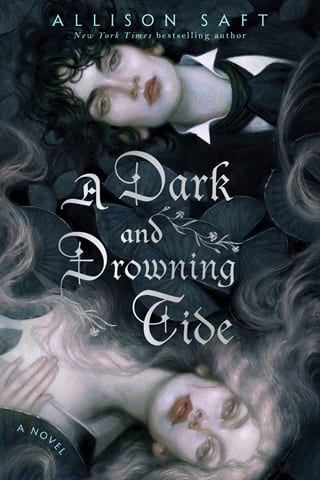Chapter Four
Four
That can’t be right.
Hours later, Sylvia’s plain shock still haunted Lorelei. Alone in her room, she turned over the image again and again: Sylvia’s slack expression, all the light and exuberance drained from her in an instant—then how quickly she’d papered it over with an empty smile.
Lorelei could not decide if she envied Wilhelm for his ability to inspire such despair in her or if she resented Sylvia for turning her nose up at the prospect of marrying a king. By all accounts, her reaction defied all reason. If she became queen of Brunnestaad, she could advocate for whatever fanciful policies she wished. She could even ensure Lorelei’s ruin if she saw fit to deprive her of her place in court out of spite. But she did not seem to believe that the Ursprung was in Albe, and infuriatingly, Lorelei agreed with her.
It felt treasonous to even entertain it. This expedition was the culmination of decades of Ziegler’s work. And yet, Lorelei had spent the last hour filled with doubt and leafing through her own notes.
Ludwig had once called them “deranged,” but she took pride in the system she had developed. Order was essential in identifying patterns in a project of this scope. She’d loosely indexed the tales she’d collected by motif and basic plot structure. For each one, she included a transcription of her conversation with the storyteller, her notes on the tale (primarily composed of snippy commentary), and the final version, cobbled together from all her sources.
Over the past year, Ziegler had brought in people from all over the kingdom for Lorelei to interview. Each province—each village, no less — had their own version of the Ursprung legend. The general sketch of the tale always followed the same beats, but they never agreed exactly on who the protagonist was, what trials he faced on his journey, what he lost by its bitter end, or even what power it granted. In a kingdom as large as Brunnestaad, variants were to be expected. But not one variant placed the Ursprung in the Albisch mountains.
Lorelei had spent months agonizing over how to present the definitive version. Which details to cut, which textures to flatten, what moral to emphasize. In the end, she’d decided on this:
Back in the days when wishes still held power, there lived a king whose realm had fallen on hard times. But no matter how poor the harvest or how hostile his enemies, he had one boon: all the waters in his land contained a strange and powerful magic. Of all those waters, the king’s greatest treasure was a pool that answered one question of each person who asked. It did not speak, but like a dark mirror, images swam on its surface. He built a chamber around it in his castle, with a skylight that let in the moon’s silver rays.
It so happened that one day, the king asked the pool where he might find power enough to save his people from those who sought to destroy them. In reply, an image took shape in the water. It showed him a spring he had never seen before, hidden in the swamplands from which mankind had first emerged. To the one it deemed worthy, it granted incredible power. But those who had been found wanting could take its power by force—at a cost.
The king ventured forth and, of course, faced three tedious challenges along the way to prove his mettle. At the end of his journey, he found a vast lake that looked to be made of starlight. But when he approached it, it did not awaken. He had been found wanting.
Enraged, the king dove in, and when he emerged again, he knew he possessed all that he wanted. He could sweep whole villages off the coastline. He could flood his enemies’ farmlands. He could rain hail the size of fists on their armies. But he soon learned that stolen power came at too high a price. Every time he wielded it, it drained his life force a little more.
Before he drew his last breath, he sealed away the knowledge of both the pool and the spring. No one, he vowed, would suffer or cause suffering as he had ever again.
Some versions suggested he died by slow and painful exsanguination. Evidently, a village a few days’ ride from Ruhigburg had kept his blood in a reliquary. She knew this only because she overheard Heike complaining that Wilhelm had brought it back to the palace and insisted on carrying it around. The man had either a morbid sense of humor or a flair for the dramatic.
A knock sounded on her door. Lorelei slammed her notebook shut with a flash of irritation. “Enter.”
As the door swung open, the string of warding bells Sylvia had installed jangled merrily. The sound grated against her, but she supposed it beat an untimely death at the hands of the wildeleute.
She was surprised to see Ziegler standing in the threshold. In the morning light, she looked soft and unruffled, with a fur-lined coat drawn tightly around her shoulders. Her hair—had there always been so much gray creeping into it?—tangled gently in the breeze coming through the open window. It wasn’t until now that Lorelei fully appreciated what the years in Ruhigburg had done to Ziegler. Before they began preparing for the expedition, she’d moved through the world like a lion in a cage. But now she was aglow. She looked almost like the woman Lorelei had met for the first time twelve years ago: a swashbuckler in her mid-thirties, hot off the runaway success of her first publication.
Ziegler’s ready smile faltered. “What’s the matter?”
“Nothing,” Lorelei said automatically. At the skeptical look on Ziegler’s face, she added, “Nothing important.”
Ziegler settled on the edge of Lorelei’s bed. “Tell me.”
“I have been thinking since our meeting.” Under the probing intensity of Ziegler’s stare, it suddenly felt difficult to speak. How ridiculous. She cleared her throat and pressed onward. “I am curious how, specifically, you arrived at your conclusion.”
Ziegler’s expression grew remote. “You doubt me as well.”
Lorelei’s gaze darted to the open window as she half willed the river to rise up and pull her under. Oblivion seemed preferable to this, but it was not in her nature to turn back once she’d set down a path. When the silence stretched on too long to bear, she said, “It’s not the conclusion I would have drawn, based on my own findings.”
“Do you trust me?”
Of course she did. For better or for worse, Ziegler had made her who she was.
Sometime after her thirtieth reread of Tales, Lorelei had, against her parents’ counsel, written a letter to Ziegler. The memory embarrassed her too much to examine closely. It had been all frills and wide-eyed praise. But to her astonishment, Ziegler had replied. More astonishing yet, she had promised to come visit her in the Yevanverte. Only, the girl Ziegler finally met wasn’t the same one who had written her the letter.
In truth, Lorelei couldn’t remember much from that time in her life. The days after Ziegler’s letter arrived had been a giddy blur. And then, a week later, Aaron died.
When Ziegler herself arrived, in the height of Lorelei’s grief-fueled stupor, she’d been both nothing like and exactly as Lorelei had envisioned. She was stocky and fast-talking, generous in spirit and mind. But she was also refreshingly brusque and ungentle. She’d grilled Lorelei on what she’d observed of nature in the Yevanverte. She’d asked her which languages she’d studied and what folktales she knew. She’d even demanded—despite Lorelei’s parents’ insistence that she could not move even a droplet of water—a demonstration of her magical ability. Ziegler had sat silently through it all, taking notes with an alarming speed and volume.
And then she’d left.
Two days later, another letter arrived, inviting Lorelei to be tutored in the natural sciences. Lorelei could still recite the entire thing word for word, but she’d clung to two lines so fervently, they were all but branded on her heart. It seems to me you’ve far too much potential to waste it making shoes and moping. How would you like to be extraordinary?
Lorelei had clung to that promise ever since. Her patience—her devotion, her trust—had been rewarded. Ziegler had earned it a thousand times over. But her evasiveness set Lorelei on edge. It was entirely unlike her, and it ill-suited her.
“With all due respect,” Lorelei replied, colder than she’d intended, “I don’t see how trust factors into it.”
Ziegler paused, then sat up straighter. “You’re right, of course. The data point to—”
“A very significant concentration of aether,” Lorelei said. The more she spoke, the more her certainty grew. “But there are, of course, a great many scattered across Brunnestaad. Relying on only one source is irresponsible. It’s—”
“You’ve done well.”
Why, then, did it feel like a dismissal? Lorelei hesitated. “I have always hoped to be of use to you.”
“And you have been. My brilliant Lorelei.” Ziegler crossed the room and rested her hands on Lorelei’s shoulders. When, Lorelei wondered absently, had she grown so much taller than Ziegler? She’d once loomed as large as a giant. “You’re tired. You’ve been too close to your work these last few months.”
It took a moment for Lorelei to register her meaning. “You think I’m mistaken.”
“I think,” she said before Lorelei could interject, her voice more forceful than it had been, “you have misinterpreted your data. However, I still made good use of your journals, if not your theory. Rest assured, I’m very certain about our destination.”
The finality of those words brooked no further discussion. Lorelei could say nothing but “Yes. Of course.”
Ziegler patted her shoulders, visibly relieved. It had been a long while since she’d extended any gesture of maternal fondness. It made Lorelei’s stomach twist violently with—what, exactly, longing? She felt vaguely disgusted with herself. Somehow, all she could think of was the barely leashed fire in Sylvia’s voice. You slink and scrape for him like a beaten hound, just as you do for Ziegler.
“I’ll give you a moment,” Ziegler said. “Come find me when you’re ready to discuss logistics.”
When the door latched shut behind her, Lorelei flung open her journal again. She did not know what she was looking for. Her own handwriting seemed an entirely foreign language to her. She slammed it shut and reached for the cold comfort of anger. She had been given one task. One simple task. How could she have misinterpreted—
Clarity doused her like a bucket of cold water. Folklore was not a science that depended on calculations, and Lorelei did not make careless mistakes. Neither did Ziegler. Her conclusion was sound, surely; she just had not seen fit to explain how she’d arrived at it.
And so, she’d lied.
Surprise came first, then an aching sort of confusion that settled heavy as a stone in Lorelei’s breast. It felt the same way it had when her father had struck her. Absently, she touched the phantom bruise on her cheek with gloved fingertips.
How strange, she thought. Ziegler had never lied to her before.
Lorelei slept fitfully. In her dreams, a sound pursued her, soft and eerie, as elusive as wind through winter-bare trees. With every step, it shivered and chimed, drawing closer and closer until—
She shot upright. The sedative she’d taken made molasses of her thoughts, and she could not be certain what was real or not. Then that incessant twinkling sound came again. The warding bells , she realized.
Someone was outside her room.
Throwing off the covers, she fumbled to turn on the gas lantern resting on her bedside table. The flame flickered to life, but the darkness was a thick veil she could not push through. The whole room swayed and shifted, and the floorboards had a sickly gleam, like fevered sweat. Outside her window, there was nothing but the jagged dark of the water, restlessly churning. The window bloomed with condensation at her touch, the glass streaked with rainwater. The sun still had not risen.
Who would be awake at this hour, to have roused her?
Plenty of people, you paranoid fool.
Prinzessin had a staff of roughly fifteen charged with stoking the boiler, steering the ship, and otherwise ensuring they didn’t starve. All of them worked early mornings, some all through the night. If not them, perhaps one of the expedition crew had risen early and nudged the string of bells as they passed. Whatever she’d heard wasn’t a wildeleute; the iron chain around her neck was cool and inert against her skin.
It could not hurt to check. If nothing else, perhaps venting her spleen on someone would make her feel better. Lorelei retrieved her gloves from the nightstand’s drawer and pulled them on, then grabbed the coat slung over the back of her desk chair. Lantern in hand, she stepped into the hallway.
The darkness yawned open. She swore she heard the faint echoes of laughter, the shattering of glass. Her breath quickened.
Damn you , get ahold of yourself.
Even after twelve years, the one weakness she’d not beaten out of herself was this childish fear of the dark. As it always did, her mind spun shadows into monsters who wore the faces of men. Blood running slick on the floor. The specter of Aaron with bone gleaming through his matted hair. Lorelei dug the heel of her palm into one eye, trying to blink away the memories overlaid on the world.
None of this was real. The dead were dead.
Prinzessin rocked against her anchor. The water churned softly. Lorelei made her way down the hall by the lantern’s glow. As she passed a window, the moon punched through the fog. Its light hemorrhaged onto the floor and sloshed against the toes of her boots. Her heart thudded louder in her ears.
The doors to the war room listed open. Lamplight fell like a blade through the threshold. Some small, fanciful part of her remembered wandering the halls of Ziegler’s home as a girl. Sometimes, she stayed overnight when their lessons went long, and when the nightmares frightened her awake, she found Ziegler in her office. She’d drone on about whatever she was working on that day until Lorelei dozed off in an armchair.
Quietly, Lorelei called out to her, “Ziegler.”
No response.
Lorelei moved farther down the hall and stopped just outside the door. More tentatively, she said, “Ziegler?”
Still, nothing.
Maybe she’d gone back to bed without extinguishing the lights, or perhaps she had fallen asleep, her manuscript as her pillow. She could be so absent-minded when she was immersed in a project. Lorelei pushed open the door. It groaned on its hinges.
Inside the war room, a dying oil lamp cast harsh shadows across the wall. A dark shape slumped over the table. Water dripped rhythmically from its fingers, which hung loose at its side. It ran off the table and spread across the floorboards like rot.
No, not water—blood.
“Ziegler!”
The scope of Lorelei’s world narrowed to a pinprick as she approached the figure. No breath stirred it. Lorelei grabbed it by the shoulder and turned it over. Its head lolled at a grotesque angle, and its skin glowed with a horrible, waxen sheen. There was a stab wound in its chest, leaking sluggishly with blood. For a moment, Lorelei couldn’t make sense of it. What lay before her scrambled itself into meaninglessness.
Ziegler’s eyes stared unseeingly into Lorelei’s.
She choked on a scream; it burned in her throat like acid. Her breaths came shallow and frantic.
“No,” she murmured. “No, no, no.”
She was dead.
Ziegler’s pale blue lips were flecked with froth and parted in an unspoken accusation. Just over her shoulder, the wintry glow of a specter rose from the floorboards.
Aaron.
His eyes were as black as the Vereist boring into her, flung wide and sightless with fear. Blood trailed from his skull like a ribbon caught in the wind.
You abandoned me, he said. You killed me.
Her breaths came harder. “No, I—”
You killed her.
Lorelei couldn’t stop it then, and she couldn’t stop it now. Death followed her relentlessly. No matter how far she ran or how high she climbed, no matter how desperately she tried to steel herself against it, it would find her. What could she ever say to make him understand? “I’m sorry! Please forgive me, sheifale, please…”
Behind her, the floorboards moaned.
It’s in your head, she told herself. It’s all in your head.
But they didn’t stop. The footsteps slowing to a stop outside the war room were real.
The door creaked open and a soft voice called, “Lorelei?”
 Fullepub
Fullepub 



